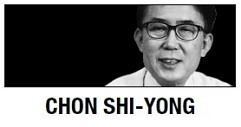 President Park Geun-hye used to be called the “queen of elections,” having led her conservative party to victory in most crucial elections since 2004.
President Park Geun-hye used to be called the “queen of elections,” having led her conservative party to victory in most crucial elections since 2004.
Things like her personal charm, older generations’ fond memories of her father and mother and southeasterners’ favoritism combined to earn her the nickname.
Wednesday’s general election deprived her of the title overnight. The queen turned out to be the biggest spoiler of the ruling party’s campaigns.
Voters hand out verdicts every election, and this time the clearest verdict was that a majority of Koreans didn’t like Park and her party. The verdict was harsh enough to pull it down to the second-largest party and hand over control of the parliament to the opposition for the first time in 16 years.
In short, the conservative ruling party fell into its gravest crisis in years, which will also weaken the leadership of Park and put her presidency into an uncomfortable partnership with a parliament controlled by the opposition.
What’s ironic is that the devastating election defeat was of Park’s own making. She made the parliament a scapegoat for any national issue that went wrong — like Korea’s economic doldrums and her lackluster reform programs.
Park frequently vented her frustration and anger at not only the opposition, but also ruling party members who did not blindly follow her policy lines. She called ruling party lawmakers like former floor leader Yoo Seong-min “traitors” and publicly called on the people to replace people like him with “sincere, truthful” politicians.
Thus came the nomination debacles, as Park’s lieutenants purged members like Yoo from the party and instead gave nomination tickets to those with less merit, but closer ties to the president.
The election outcome clearly showed voters thought Park was wrong. More importantly, Park and her associates were mistaken for believing that voters — especially those in the party’s home base southeast — will give their ballots to whoever is sent by the president.
Contrary to Park’s anticipation, Yoo, the man on the top of Park’s blacklist, cruised to an easy victory in Daegu, the president’s hometown, with the second-highest support rate — 76 percent — among the 253 constituencies across the country. The man who Park wanted to bury became a sort of hero.
The fact that Saenuri lost a record-high 17 of the 65 seats in the southeast region to opposition and independent candidates also reflected that voters there no longer hold on to blind allegiance to Park and the ruling party.
Elsewhere, the “anything but Park and Saenuri” sentiment was more apparent. Saenuri Party candidates managed to win 35 — less than one third — of the 122 races in the greater Seoul area.
The area, which includes Gyeonggi Province and Incheon City, is relatively free from the regional favoritism in the southern parts of the country and thus often determines which party will be the overall winner of elections.
The result was shocking to Park and Saenuri since they expected the split in their opposition opponents — owing to the emergence of the People’s Party led by Ahn Cheol-soo — would give the ruling party a clear upper hand in the neutral regions.
But Korean voters were wise enough to this, and they threw their support to The Minjoo Party of Korea candidates, believing that People’s Party candidates were not yet strong enough to defeat Saenuri Party candidates.
In other words, voters in the region voted more to punish Park and the ruling party than to support the Minjoo Party. The fact that the People’s Party garnered more votes than the Minjoo Party for candidates elected under the proportional representation and the former replaced the latter as the top party in the southwest — the latter’s home base for several decades — is further evidence that many voters did not like the Minjoo Party either.
In all regards, Park was the biggest loser in the election, and it will have lasting impact on the remainder of her presidency set to end in about two years. It is unfortunate that she lost the queen’s crown at a time when she needed it most.
By Chon Shi-yong
Chon Shi-yong is the chief editorial writer of The Korea Herald. He can be reached at sychon@heraldcorp.com. — Ed.

